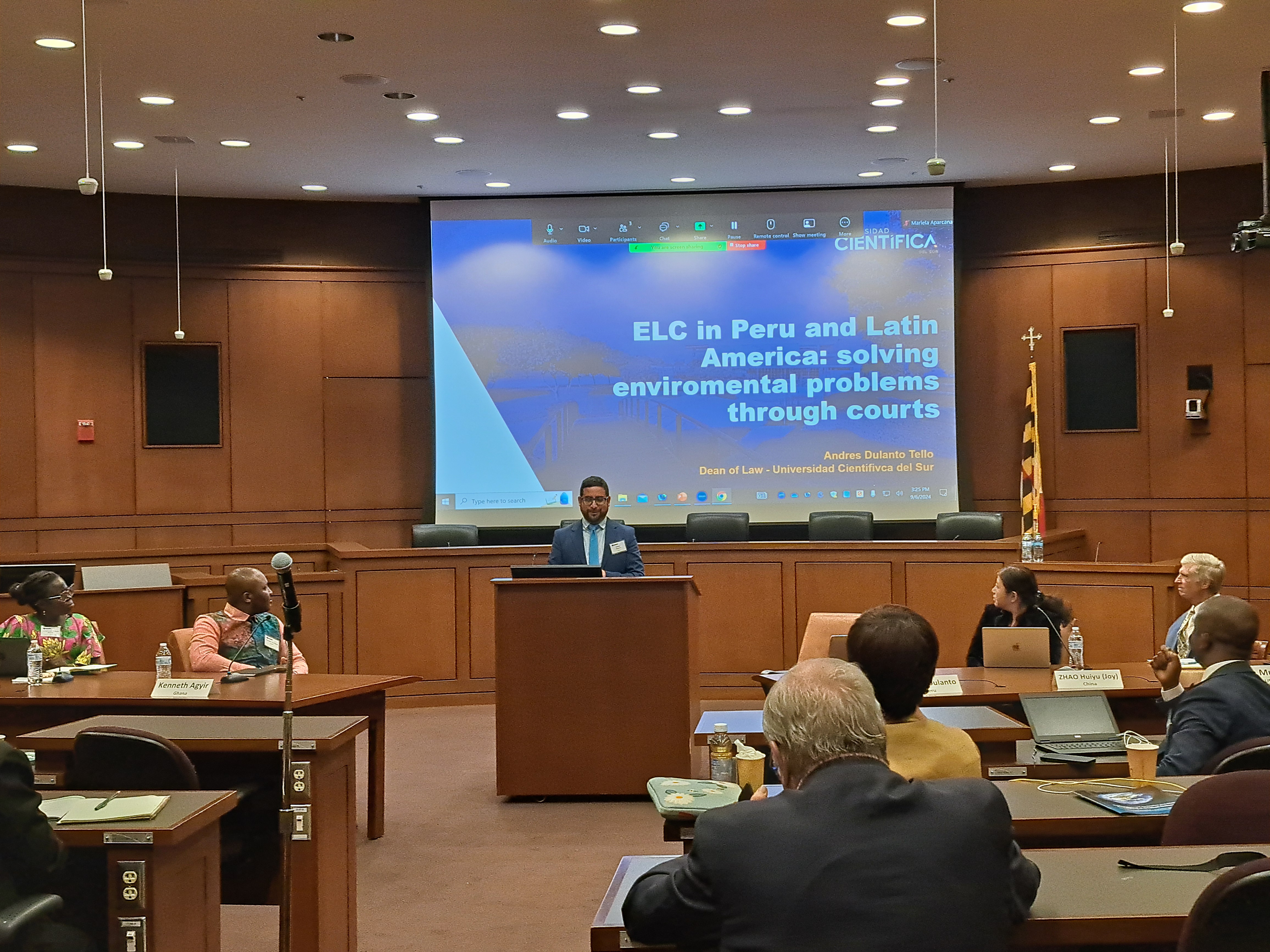Photo: Andres Dulanto Tello, dean of law at Universidad Científica del Sur in Peru, speaks during a panel presentation on environmental advocacy through litigation
The Environmental Law Program at the University of Maryland Francis King Carey School of Law hosted a groundbreaking conference bringing together environmental clinics and non-profit advocacy organizations on September 4-7. Titled, “Environmental Law Clinics and NGOs: Creating a Global Network,” the conference was an important step toward the goal of building cooperation among worldwide environmental advocates. Countries represented included China, Gambia, Ghana, Guinea, Kenya, Malawi, Mexico, Nigeria, Peru, the Philippines, South Korea, Thailand, Turkey, Uganda, Zambia, and Zimbabwe.
“Environmental issues are global issues,” said William Piermattei, managing director of the Environmental Law Program. “Our aim is to create a global network of change-makers who will collaborate on problems like climate change that know no borders.”
The conference was jointly organized by Maryland Carey Law and the Center for Transnational Environmental Accountability, whose director, prominent Chinese environmental lawyer Zhang Jingjing, is also a lecturer in the Environmental Law Program.
The Center for Transnational Environmental Accountability (CTEA) is a non-profit organization that supports communities impacted by Chinese international investments and climate change. Zhang launched CTEA out of the Environmental Law Clinic at Maryland Carey Law and continues to partner with the clinic, offering law students opportunities to work on its international cases. That innovative partnership exemplifies the kind of cooperation the Environmental Law Program leaders and Zhang said they hoped to inspire among global NGOs and law school clinics at the conference.
A third conference organizer was the student-run Maryland Journal of International Law. Connor Lemma ’25, the journal’s editor-in-chief, appreciated the opportunity to participate.
“Journal staff and Maryland Carey Law students were not only exposed to innovative academic discussions,” said Lemma, “but were also provided with a concrete framework to contribute to efforts combatting the climate crisis.”
The journal plans to produce a special symposium issue featuring the keynote speakers’ talks as narrative essays and select panelist essays.
Conference presenters were a who’s who of experts, scholars, and practitioners in the field of environmental law and human rights. The conference featured five panels, two keynote addresses, and multiple informal get-togethers and discussions throughout the weekend.
Zhang and Professor Robert Percival, director of Maryland Carey Law’s Environmental Law Program, offered Thursday evening opening remarks before the first keynote given by Paul Hoffman, director of the Civil Rights Clinic and co-director of the International Human Rights Clinic at the University of California-Irvine.
Hoffman spoke on “Helping Students Change the World: Litigating Under the Alien Tort Statute.” A top litigator of claims brought under the Alien Tort Statute, he was lead counsel in the U.S. Supreme Court case of Kiobel v. Royal Dutch Petroleum Co. In the landmark case John Doe I v. Exxon Mobil Corp, he was a member, along with Maryland Carey Law’s Professor Matiangai Sirleaf, of the legal team that recently received the Public Justice Trial Lawyer of the Year Award for holding Exxon Mobil accountable for atrocities committed by its contractors in an Indonesian village.
The second keynote came from Gloria Majiga-Kamoto, program officer at the Center for Environmental Policy and Advocacy (CEPA) in Malawi, who spoke on “Grassroots Activism and the Role of Environmental Law Clinics.” In 2021, Majiga-Kamoto was awarded the Goldman Environmental Prize for her role in mobilizing civil society advocacy against single-use plastic production and distribution in Malawi.
Panel topics included:
- A Global Perspective of Clinic-NGO Collaboration
- Community Representation: Opportunities and Challenges
- Climate Change Energy Transition and Mining in Africa
- Environmental Advocacy through Litigation
- Non-Litigation Environmental Advocacy
Also in attendance was a group of students and faculty from Malawi. Their two-week visit to Maryland Carey Law was part of a collaborative course between Maryland Carey Law and the University of Malawi, which enables students to explore the intersection of environmental justice, human rights, and public health through international and comparative legal lenses. Students from Maryland Carey Law visited Malawi last May.
Chikosa Banda, senior law lecturer and faculty advisor for the Environmental Justice Clinic at the University of Malawi, spoke on the Non-Litigation Environmental Advocacy panel. As well as attending the conference and classes, the Malawi group enjoyed outings hosted by Maryland Carey Law faculty to destinations including Washington, D.C., Annapolis, and Harpers Ferry. These included visits to the U.S. Supreme Court and State Department.
This conference was just one effort in the Environmental Law Program’s ongoing work to bring together environmental advocates from around the world to address today's global environmental challenges. The program is home to the secretariat of the International Union for Conservation of Nature (IUCN) Academy of Environmental Law in partnership with the Elisabeth Haub School of Law at Pace University and their top-ranked Environmental Law Program.
Program director Professor Robert Percival is a leading scholar and teacher in the field of global environmental law and executive director of the IUCN Academy of Environmental Law. He has led more than a dozen environmental law student field trips to China, the Middle East, and Africa.
Support for this conference has been generously provided by the University of Maryland, Baltimore Center for Global Engagement, the Fedder Environmental Scholars Endowment, and the Quinn, Ward and Kershaw Environmental Law Endowment.

